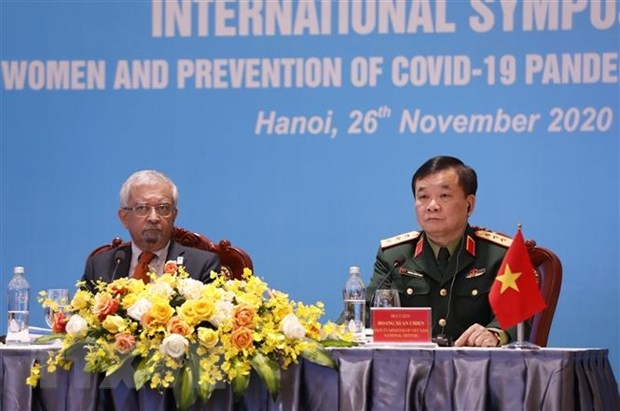International symposium highlights role of women in peacekeeping operations
VOV.VN - The Vietnam Ministry of Defence and the United Nations Development Program (UNDP) in Vietnam co-hosted an international symposium on November 26 to discuss the role of women and prevention activities relating to the novel coronavirus (COVID-19) pandemic during peacekeeping operations.

Deputy Defence Minister Senior Lieutenant General Hoang Xuan Chien and Kamal Malhotra, resident coordinator of the UN in Vietnam cum UNDP resident representative in Vietnam, co-chaired the event which involved the participation of representatives from 15 nations and international organisations.
The symposium was held for the purpose of reaffirming the country’s strong commitments to issues of women, peace, and security, as well as its participation in UN peacekeeping activities. It also serves to demonstrate the nation’s proactive nature in taking on the dual role of a non-permanent member of the United Nations Security Council and the ASEAN Chair.
The occasion is part of several activities held to mark the 20th anniversary of the promulgation of the UN Resolution 1325 on women, peace, and security.
The online conference is widely considered to be an opportunity in which to strengthen the exchange of expertise, share experience between various countries with regard to the role of women, and respond to the COVID-19 epidemic. This is in addition to stepping up co-operation between countries whilst enhancing the role and position of the nation regionally and globally in terms of UN peacekeeping operations, along with its status as having competently dealt with the COVID-19 epidemic.
In his address, Deputy Defence Minister Chien emphasised that UN and Southeast Asian nation members are making every effort to increase women's participation in the UN peacekeeping forces in a sustainable manner.
Over the past five years, both the overall number and the proportion of women joining peacekeepers in Southeast Asia has witnessed a surge. Indonesia, Cambodia, and Malaysia currently have the highest number of women operating in UN peacekeeping forces in the region, while Vietnam and Cambodia are both showing their strong efforts with regard to a relative increase in female military participation.
The country officially joined the UN peacekeeping operations in 2014, with the nation dispatching the first female officer to participate in UN peacekeeping operations as a tactical staff officer in South Sudan in January, 2018. Following this, October, 2018, saw the country successfully work on a level-two field hospital No. one for the UN mission in Bentiu, South Sudan, in which there were 10 female soldiers out of a total of 63 staff, medical workers, and doctors, accounting for approximately 16% of on-site staff. Indeed, the proportion of women was higher than the level initially set out by the UN.
In November, 2019, the nation deployed level-two Field Hospital No. two in an effort replace field hospital No. one, whilst continuing to maintain the participation rate of female soldiers as equal to the number of females at the first field hospital.
Vietnamese female soldiers are highly appreciated by the UN for their professionalism and ability to complete missions, whilst they are viewed as a bright spot in many UN activities and field missions, especially in terms of citizen diplomacy.
Moving forward, the Vietnam Ministry of Defence will continue to maintain and consider the possibility of further increasing the proportion of women who join in this activity, especially female soldiers who desire to apply for admission to work in higher positions at the UN headquarters.
During the course of the symposium, a number of main topics were debated, including the role of women in UN peacekeeping operations amid the COVID-19 pandemic and epidemic prevention and control efforts in UN peacekeeping missions. This was in addition to practical activities from the UNMISS Mission in South Sudan, and proposals on international initiatives to promote the role of women in peacekeeping operations.
